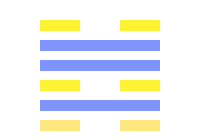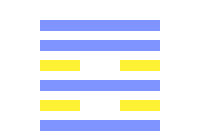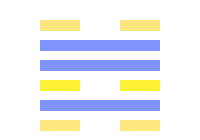47.2.3.4.5.6 (47 > 52)

47.2.3.4.5.6 (47 > 52) - THE KHWĂN HEXAGRAM.
- 2. The second line, undivided, shows its subject straitened amidst his wine and viands. There come to him anon the red knee-covers (of the ruler). It will be well for him (to maintain his sincerity as) in sacrificing. Active operations (on his part) will lead to evil, but he will be free from blame.
- 3. The third line, divided, shows its subject straitened before a (frowning) rock. He lays hold of thorns. He enters his palace, and does not see his wife. There will be evil.
- 4. The fourth line, undivided, shows its subject proceeding very slowly (to help the subject of the first line), who is straitened by the carriage adorned with metal in front of him. There will be occasion for regret, but the end will be good.
- 5. The fifth line, undivided, shows its subject with his nose and feet cut off. He is straitened by (his ministers in their) scarlet aprons. He is leisurely in his movements, however, and is satisfied. It will be well for him to be (as sincere) as in sacrificing (to spiritual beings).
- 6. The sixth line, divided, shows its subject straitened, as if bound with creepers ; or in a high and dangerous position, and saying (to himself), ‘If I move, I shall repent it.’ If he do repent of former errors, there will be good fortune in his going forward.
47.2.3.4.5.6 (47 > 52) - The embarrassment
One is busy doing as usual so that no one notices what has changed.
Bing DeepL Google Yandex47.2.3.4.5.6 (47 > 52) - The embarrassment
One is busy doing as usual so that no one notices what has changed.
Bing DeepL Google Yandex47.2.3.4.5.6 (47 > 52) - K’uán, la détresse
K’uán : détresse, abattement, dureté, sévérité, mauvais traitements.
- 2. Cet homme est dans la détresse quant au boire et au manger. Mais tout à coup apparaît la couverture rouge (du char du roi) (ou le secours), il est délivré, il pourra offrir des dons et sacrifices, il châtiera les méchants sans éprouver de dommage. [La ferme droiture est digne d’éloges. Com. II.] L’arrivée du roi ou des gens le sauve.
- 3. Serré contre un rocher, poignant (pour se soutenir) dans des buissons pleins de grosses épines, ou rentrant dans sa maison et n’y trouvant pas sa femme (enlevée par des brigands). [Cas douloureux, mauvaise fortune. Com. II.]
- 4. Autre cas). Homme avançant avec précaution, en détresse et quant à l’argent et quant à son char (qu’il a perdu) ; il est en grand danger d’être pris.
-
5. (Id.) Homme auquel on a entaillé le nez et les pieds, maltraité par les gens du peuple (les chemises rouges). [S’il sait encore rester ferme et digne, il pourra utilement offrir le sacrifice.
L’homme au nez entaillé figure celui qui échoue dans ses entreprises. S’il reste ferme dans la justice, il retrouvera le bonheur. Com. II.] - 6. Un homme en détresse, pris dans des buissons épais, sur une hauteur exposée aux dangers et qui se dit : si je bouge, je le paierai cher. [Quand on éprouve le repentir, on peut corriger le mal et alors on sera heureux. Com. II.].
47.2.3.4.5.6 (47 > 52) - La gêne
On s'occupe de faire comme d'habitude pour que personne ne remarque ce qui a changé.
Bing DeepL Google Yandex47.2.3.4.5.6 (47 > 52) - Kényelmetlenség
- 2. Nem vár semmit, amikor egy váratlan látogató lehetővé teszi hogy felülvizsgálja ítéleteit.
- 3. Elveszti az ítélőképességét, így meg kell kérnie azokat, akiket figyelmen kívül hagyott, hogy segítsenek.
- 4. Mielőtt másokhoz csatlakozna, meg kell felelnie jótevői igényeinek.
- 5. Hiteltelen, de ha megmutatja elkötelezettségét, hallgatni fognak rá.
- 6. Nem akarja folytatni de sikeres lehet.
The trigrams
The trigrams are combinations of three yin and yang lines. The three bottom lines of the hexagram form the lower trigram and represent the inner situation. The three top lines form the upper trigram and represent the outer situation.
Upper trigram: The lake The mountain


Lower trigram: The water The mountain


The formation: 47
What is already there

47 - THE KHWĂN HEXAGRAM.
In (the condition denoted by) Khwăn there may (yet be) progress and success. For the firm and correct, the (really) great man, there will be good fortune. He will fall into no error. If he make speeches, his words cannot be made good.
Bing DeepL Google Yandex47 - The embarrassment
Circumstances or appearances play against one. Justifying oneself is useless, one will be understood later.
Bing DeepL Google Yandex47 - The embarrassment
Circumstances or appearances play against one. Justifying oneself is useless, one will be understood later.
Bing DeepL Google Yandex47 - K’uán, la détresse
K’uán : détresse, abattement, dureté, sévérité, mauvais traitements.
K’uan « détresse, abattement (dureté, sévérité) ». Celui qui, dans le danger, ne perd pas son principe de développement et qui en détresse même est encore calme et content, c’est l’homme vraiment grand (kiun tzè). Mais d’abord il peut commettre quelque erreur, tomber en détresse s’il se fie à toute parole ; qu’il ne le fasse pas, car la parole est peu sûre.
Texte
Droit et ferme, le grand homme sera heureux. Qu’il ne se fie pas à tout ce qu’on lui dit. — K’uán est le fort saisi, emprisonné, en détresse.
Symbolisme
Marais sans eau, cela figure la détresse. — Le sage expose même sa vie pour atteindre son but.
Commentaire
K’uán est celui qui est dans la détresse, le danger. Si alors même, il ne perd pas sa grandeur d’âme, c’est vraiment un grand homme. L’homme grand prospère s’il reste fermement vertueux. Mais qu’il ne se fie pas aux dires ; les estimer hautement, c’est s’exposer à sa perte.
47 - La gêne
Les circonstances ou les apparences jouent en notre défaveur. Se justifier est inutile, on sera compris plus tard.
Bing DeepL Google Yandex47 - Kényelmetlenség
A körülmények vagy a kinézet negatív szerepet játszik. Magyarázni felesleges, később meg fogjuk érteni.
Bing DeepL Google Yandex
47.2 (47 > 45) - THE KHWĂN HEXAGRAM.
The second line, undivided, shows its subject straitened amidst his wine and viands. There come to him anon the red knee-covers (of the ruler). It will be well for him (to maintain his sincerity as) in sacrificing. Active operations (on his part) will lead to evil, but he will be free from blame.
Bing DeepL Google Yandex47.2 (47 > 45) - Recruiting assistants
One did not expect anything when an unexpected visit occurs that will allow one to revise one's judgment.
Bing DeepL Google Yandex47.2 (47 > 45) - Recruiting assistants
One did not expect anything when an unexpected visit occurs that will allow one to revise one's judgment.
Bing DeepL Google Yandex47.2 (47 > 45) - K’uán, la détresse
K’uán : détresse, abattement, dureté, sévérité, mauvais traitements.
Cet homme est dans la détresse quant au boire et au manger. Mais tout à coup apparaît la couverture rouge (du char du roi) (ou le secours), il est délivré, il pourra offrir des dons et sacrifices, il châtiera les méchants sans éprouver de dommage. [La ferme droiture est digne d’éloges. Com. II.] L’arrivée du roi ou des gens le sauve.
Bing DeepL Google Yandex47.2 (47 > 45) - Recruter des assistants
On n'attendait rien, quand survient une visite imprévue qui permettra de réviser son jugement.
Bing DeepL Google Yandex47.2 (47 > 45) - Kényelmetlenség
Nem vár semmit, amikor egy váratlan látogató lehetővé teszi hogy felülvizsgálja ítéleteit.
Bing DeepL Google Yandex
47.3 (47 > 28) - THE KHWĂN HEXAGRAM.
The third line, divided, shows its subject straitened before a (frowning) rock. He lays hold of thorns. He enters his palace, and does not see his wife. There will be evil.
Bing DeepL Google Yandex47.3 (47 > 28) - Being demoralised
One loses one' s means so one must ask for help from those whom one had neglected.
Bing DeepL Google Yandex47.3 (47 > 28) - Being demoralized
One loses one' s means so one must ask for help from those whom one had neglected.
Bing DeepL Google Yandex47.3 (47 > 28) - K’uán, la détresse
K’uán : détresse, abattement, dureté, sévérité, mauvais traitements.
Serré contre un rocher, poignant (pour se soutenir) dans des buissons pleins de grosses épines, ou rentrant dans sa maison et n’y trouvant pas sa femme (enlevée par des brigands). [Cas douloureux, mauvaise fortune. Com. II.]
Bing DeepL Google Yandex47.3 (47 > 28) - Être démoralisé
On perd ses moyens alors on doit demander de l'aide à ceux que l'on avait négligé.
Bing DeepL Google Yandex47.3 (47 > 28) - Kényelmetlenség
Elveszti az ítélőképességét, így meg kell kérnie azokat, akiket figyelmen kívül hagyott, hogy segítsenek.
Bing DeepL Google Yandex
47.4 (47 > 29) - THE KHWĂN HEXAGRAM.
The fourth line, undivided, shows its subject proceeding very slowly (to help the subject of the first line), who is straitened by the carriage adorned with metal in front of him. There will be occasion for regret, but the end will be good.
Bing DeepL Google Yandex47.4 (47 > 29) - Being kept by one' s sovereign
Before joining others, one has to satisfy the demands of one's benefactors.
Bing DeepL Google Yandex47.4 (47 > 29) - Being kept by one' s sovereign
Before joining others, one has to satisfy the demands of one's benefactors.
Bing DeepL Google Yandex47.4 (47 > 29) - K’uán, la détresse
K’uán : détresse, abattement, dureté, sévérité, mauvais traitements.
Autre cas). Homme avançant avec précaution, en détresse et quant à l’argent et quant à son char (qu’il a perdu) ; il est en grand danger d’être pris.
Bing DeepL Google Yandex47.4 (47 > 29) - Être retenu par son souverain
Avant de rejoindre les autres on doit satisfaire les demandes de ses bienfaiteurs.
Bing DeepL Google Yandex47.4 (47 > 29) - Kényelmetlenség
Mielőtt másokhoz csatlakozna, meg kell felelnie jótevői igényeinek.
Bing DeepL Google Yandex
47.5 (47 > 40) - THE KHWĂN HEXAGRAM.
The fifth line, undivided, shows its subject with his nose and feet cut off. He is straitened by (his ministers in their) scarlet aprons. He is leisurely in his movements, however, and is satisfied. It will be well for him to be (as sincere) as in sacrificing (to spiritual beings).
Bing DeepL Google Yandex47.5 (47 > 40) - Facing disbelief
One is not believed, but if one shows one's commitment, then one will be listened to.
Bing DeepL Google Yandex47.5 (47 > 40) - Facing disbelief
One is not believed, but if one shows one's commitment, then one will be listened to.
Bing DeepL Google Yandex47.5 (47 > 40) - K’uán, la détresse
K’uán : détresse, abattement, dureté, sévérité, mauvais traitements.
(Id.) Homme auquel on a entaillé le nez et les pieds, maltraité par les gens du peuple (les chemises rouges). [S’il sait encore rester ferme et digne, il pourra utilement offrir le sacrifice.
L’homme au nez entaillé figure celui qui échoue dans ses entreprises. S’il reste ferme dans la justice, il retrouvera le bonheur. Com. II.]
47.5 (47 > 40) - Affronter l'incrédulité
On n'est pas cru mais si l'on montre son engagement, alors on sera écouté.
Bing DeepL Google Yandex47.5 (47 > 40) - Kényelmetlenség
Hiteltelen, de ha megmutatja elkötelezettségét, hallgatni fognak rá.
Bing DeepL Google Yandex
47.6 (47 > 6) - THE KHWĂN HEXAGRAM.
The sixth line, divided, shows its subject straitened, as if bound with creepers ; or in a high and dangerous position, and saying (to himself), ‘If I move, I shall repent it.’ If he do repent of former errors, there will be good fortune in his going forward.
Bing DeepL Google Yandex47.6 (47 > 6) - Suffering one last setback
One does not want to continue but one can succeed.
Bing DeepL Google Yandex47.6 (47 > 6) - Suffering one last setback
One does not want to continue but one can succeed.
Bing DeepL Google Yandex47.6 (47 > 6) - K’uán, la détresse
K’uán : détresse, abattement, dureté, sévérité, mauvais traitements.
Un homme en détresse, pris dans des buissons épais, sur une hauteur exposée aux dangers et qui se dit : si je bouge, je le paierai cher. [Quand on éprouve le repentir, on peut corriger le mal et alors on sera heureux. Com. II.].
Bing DeepL Google Yandex47.6 (47 > 6) - Essuyer son dernier revers
On ne veut plus continuer mais on peut réussir.
Bing DeepL Google YandexIn the making: 52
What is poised to happen

52 - THE KĂN HEXAGRAM.
When one's resting is like that of the back, and he loses all consciousness of self; when he walks in his courtyard, and does not see any (of the persons) in it, there will be no error.
Bing DeepL Google Yandex52 - Stop
One recognizes that it is time to stop because one needs to feed oneself.
Bing DeepL Google Yandex52 - Stop
One recognizes that it is time to stop because one needs to feed oneself.
Bing DeepL Google Yandex52 - Kán, l’arrêt
Kán : ferme, tenir droit, bien réglé, arrêter, reposer
Kan « ferme ». L’homme ferme tourne le dos et s’oppose résolument, sans tenir compte de lui-même. S’il traverse un endroit, il ne regarde pas qui y est et ne faillit point.
Texte
L’homme ferme s’oppose résolument (au mal) sans tenir compte de lui-même. Devant traverser un endroit, il ne regarde pas qui s’y trouve (mais le fait résolument) et ne faillit point.
Symbolisme
Deux montagnes superposées forment le Koua. Ainsi l’homme supérieur pense à ne pas dépasser les bornes de ses fonctions.
Commentaire
Kán signifie s’arrêter, tenir ferme, en bon ordre, agir ou s’arrêter selon l’occasion. Quand l’acte et sa cessation ont lieu en temps convenable, la conduite est belle et intelligente. « Rester à sa place », cela veut dire que les grands et les petits sont en rapport, mais sans usurpation ni entre-croisement. Celui qui est ferme et attentif à son devoir ne se recherche pas lui-même. Marchant dans son jardin, il ne voit pas même qui s’y trouve.
Note. Tout ceci illustre le sens « tenir droit, bien réglé » et se réfère aux rites du maintien extérieur qui prescrivent de se tenir toujours droit et de ne pas même s’asseoir sur un siège qui n’est pas droit.
52 - Cesser
On reconnaît qu'il est temps de s'arrêter car on a besoin de s'alimenter.
Bing DeepL Google Yandex52 - Megállás
Felismeri hogy itt az ideje megállni mert a többieket táplálni kell.
Bing DeepL Google YandexThe nuclear hexagram: 37.1.2.3.4.5.6 (37 > 40)
The nuclear hexagram is the association of the two inner trigrams (lines 2,3,4 and 3,4,5). It represents the root, or the origin of the situation.

37.1.2.3.4.5.6 (37 > 40) - THE KIÂ ZĂN HEXAGRAM.
- 1. The first line, undivided, shows its subject establishing restrictive regulations in his household. Occasion for repentance will disappear.
- 2. The second line, divided, shows its subject taking nothing on herself, but in her central place attending to the preparation of the food. Through her firm correctness there will be good fortune.
- 3. The third line, undivided, shows its subject (treating) the members of the household with stern severity. There will be occasion for repentance, there will be peril, (but) there will (also) be good fortune. If the wife and children were to be smirking and chattering, in the end there would be occasion for regret.
- 4. The fourth line, divided, shows its subject enriching the family. There will be great good fortune.
- 5. The fifth line, undivided, shows the influence of the king extending to his family. There need be no anxiety ; there will be good fortune.
- 6. The topmost line, undivided, shows its subject possessed of sincerity and arrayed in majesty. In the end there will be good fortune.
37.1.2.3.4.5.6 (37 > 40) - Knowing how to improvise
One works quickly and well despite the absence of instructions.
Bing DeepL Google Yandex37.1.2.3.4.5.6 (37 > 40) - Knowing how to improvise
One works quickly and well despite the absence of instructions.
Bing DeepL Google Yandex37.1.2.3.4.5.6 (37 > 40) - Kia, la parenté, le clan
Kiā : famille, maison.
-
1. Celui dont la maison est bien protégée n’aura rien à craindre.
C’est celui dont la volonté ne varie point. -
2. Si l’on n’a pas besoin d’aller au-dehors, mais que les provisions soient accumulées dans l’intérieur de la maison, elle sera prospère.
Il faut douceur dans la prospérité. -
3. Si les gens de la maison sont graves et attentifs, craintifs et sachant regretter une erreur, tout ira bien. Si l’épouse et les enfants sont légers et bavards, la fin ne sera pas heureuse.
Si les uns ne faillissent pas, les autres manqueront aux lois de la famille. -
4. Pourvoir abondamment sa maison est une assurance de grands succès.
Ce sera quand la complaisance (des chefs) et la docilité (des subordonnés) seront en leur lieu. -
5. Avoir une maison puissante est pour le roi une source de sécurité (il ne devra pas craindre, etc.).
C’est quand il y a mutuelle affection entre ses membres. -
6. Droit, juste et plein de majesté, le roi aura une fin heureuse.
La vraie dignité restaure la nature en son état d’intégrité primitive.
37.1.2.3.4.5.6 (37 > 40) - Savoir improviser
On travaille vite et bien malgré l'absence de consignes.
Bing DeepL Google Yandex37.1.2.3.4.5.6 (37 > 40) - Rokonok
- 1. Kifejti egy közelállónak hogy ne menjen tovább.
- 2. Nem választja a hozzá nem értőt.
- 3. Ha látja hogy a hozzátartozói zavarodottak, kérje meg őket hogy másokat ne zavarjanak.
- 4. Csak azt veszi meg amire szükség van.
- 5. Meglátogatja közeli szeretteit.
- 6. Hívja közeli szeretteit hogy csatlakozzanak hozzá.
Ruler
The starting situation

47.6 (47 > 6) - THE KHWĂN HEXAGRAM.
The sixth line, divided, shows its subject straitened, as if bound with creepers ; or in a high and dangerous position, and saying (to himself), ‘If I move, I shall repent it.’ If he do repent of former errors, there will be good fortune in his going forward.
Bing DeepL Google Yandex47.6 (47 > 6) - Suffering one last setback
One does not want to continue but one can succeed.
Bing DeepL Google Yandex47.6 (47 > 6) - Suffering one last setback
One does not want to continue but one can succeed.
Bing DeepL Google Yandex47.6 (47 > 6) - K’uán, la détresse
K’uán : détresse, abattement, dureté, sévérité, mauvais traitements.
Un homme en détresse, pris dans des buissons épais, sur une hauteur exposée aux dangers et qui se dit : si je bouge, je le paierai cher. [Quand on éprouve le repentir, on peut corriger le mal et alors on sera heureux. Com. II.].
Bing DeepL Google Yandex47.6 (47 > 6) - Essuyer son dernier revers
On ne veut plus continuer mais on peut réussir.
Bing DeepL Google YandexCorrection
The direction where the ruler is going to bend

47.2.3.4.5 (47 > 15) - THE KHWĂN HEXAGRAM.
- 2. The second line, undivided, shows its subject straitened amidst his wine and viands. There come to him anon the red knee-covers (of the ruler). It will be well for him (to maintain his sincerity as) in sacrificing. Active operations (on his part) will lead to evil, but he will be free from blame.
- 3. The third line, divided, shows its subject straitened before a (frowning) rock. He lays hold of thorns. He enters his palace, and does not see his wife. There will be evil.
- 4. The fourth line, undivided, shows its subject proceeding very slowly (to help the subject of the first line), who is straitened by the carriage adorned with metal in front of him. There will be occasion for regret, but the end will be good.
- 5. The fifth line, undivided, shows its subject with his nose and feet cut off. He is straitened by (his ministers in their) scarlet aprons. He is leisurely in his movements, however, and is satisfied. It will be well for him to be (as sincere) as in sacrificing (to spiritual beings).
47.2.3.4.5 (47 > 15) - The embarrassment
One tries an experiment that endangers one's reputation.
Bing DeepL Google Yandex47.2.3.4.5 (47 > 15) - The embarrassment
One tries an experiment that endangers one's reputation.
Bing DeepL Google Yandex47.2.3.4.5 (47 > 15) - K’uán, la détresse
K’uán : détresse, abattement, dureté, sévérité, mauvais traitements.
- 2. Cet homme est dans la détresse quant au boire et au manger. Mais tout à coup apparaît la couverture rouge (du char du roi) (ou le secours), il est délivré, il pourra offrir des dons et sacrifices, il châtiera les méchants sans éprouver de dommage. [La ferme droiture est digne d’éloges. Com. II.] L’arrivée du roi ou des gens le sauve.
- 3. Serré contre un rocher, poignant (pour se soutenir) dans des buissons pleins de grosses épines, ou rentrant dans sa maison et n’y trouvant pas sa femme (enlevée par des brigands). [Cas douloureux, mauvaise fortune. Com. II.]
- 4. Autre cas). Homme avançant avec précaution, en détresse et quant à l’argent et quant à son char (qu’il a perdu) ; il est en grand danger d’être pris.
-
5. (Id.) Homme auquel on a entaillé le nez et les pieds, maltraité par les gens du peuple (les chemises rouges). [S’il sait encore rester ferme et digne, il pourra utilement offrir le sacrifice.
L’homme au nez entaillé figure celui qui échoue dans ses entreprises. S’il reste ferme dans la justice, il retrouvera le bonheur. Com. II.]
47.2.3.4.5 (47 > 15) - La gêne
On tente une expérience qui met en danger sa réputation.
Bing DeepL Google Yandex47.2.3.4.5 (47 > 15) - Kényelmetlenség
- 2. Nem vár semmit, amikor egy váratlan látogató lehetővé teszi hogy felülvizsgálja ítéleteit.
- 3. Elveszti az ítélőképességét, így meg kell kérnie azokat, akiket figyelmen kívül hagyott, hogy segítsenek.
- 4. Mielőtt másokhoz csatlakozna, meg kell felelnie jótevői igényeinek.
- 5. Hiteltelen, de ha megmutatja elkötelezettségét, hallgatni fognak rá.

